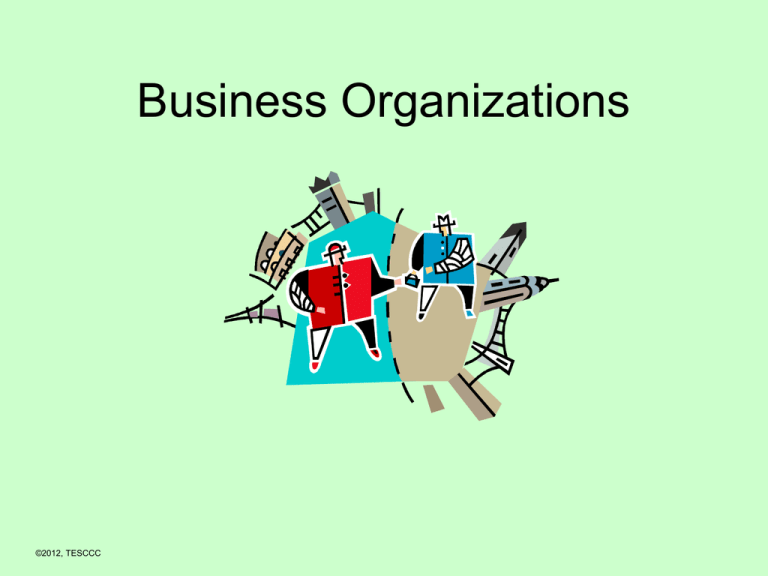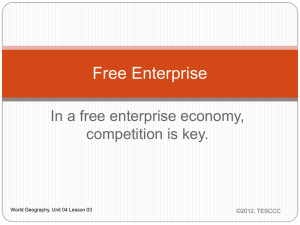Business Organizations
advertisement

Business Organizations ©2012, TESCCC Objectives 1. Be able to list and describe the three types of business organizations. 2. Be able to explain the advantages and disadvantages of the three types of businesses. ©2012, TESCCC Business Organization • Profit-seeking enterprise that produces goods or services or carries on commercial enterprise. ©2012, TESCCC Sole Proprietorship • • • • Most common form - most numerous A single owner-controlled business Easy to form; easy to end business Doesn’t share profit, doesn’t pay special tax • Sense of personal freedom • 75% of all businesses ©2012, TESCCC Disadvantages of Sole Proprietorship • • • • • Has unlimited liability Difficulty raising capital Limited life Inefficiency Limited managerial experience ©2012, TESCCC Partnership- jointly owned by two or more persons • Limited Partnership: no active role in running business – limits liability • General Partnership: all partners responsible for management and financial obligations • Limited Liability Partnership: all partners are limited partners ©2012, TESCCC Partnerships Strengths • Easy to start • Lack of special taxes • Easier to attract financial capital than a sole proprietorship • Shared decision making ©2012, TESCCC Partnerships Weaknesses • Liability for other partner as well as personal liability • Limited life • Potential for conflict ©2012, TESCCC Corporation – separate legal entity • • • • Artificial person Files charter to form Sells stock Ownership divided to shareholders or stockholders • Pays dividend • Two types of stock • common stock • preferred stock ©2012, TESCCC Types of Corporations • Closely Held Corporations: also known as privately held corporations. Stock is issued to only a few people, often family members • Publicly Held Corporations: Many shareholders who can buy and sell stock on the open market ©2012, TESCCC Corporation Strengths • • • • • • Ease of raising financial capital Hire professional to run corporation Limited liability Unlimited life Ease of transferring ownership 90% of sales ©2012, TESCCC Corporation Weaknesses • Difficult to start • Shareholders have little say in how business is run • Must pay special tax (taxed twice) • More government regulation ©2012, TESCCC Franchise • Contract between a franchiser (corporation) and a franchisee (sole proprietor) • Very popular among restaurants and fast food places; many chain stores use this method to expand a proven idea Franchise Franchisee Provides • • • • Building/Facilities Employees Fee or % of profits Management Franchiser Provides • • • • Supplies Legal Help Training Advertising Franchise Advantages • Know idea works • Easier start up legally • Receive business training • Allows corporation to expand at lower cost • Legal protection Disadvantages • Cannot use your own ideas • Must follow the contract • Could be closed if low performing • Franchisee may be poor manager











